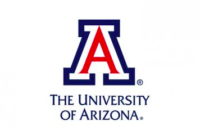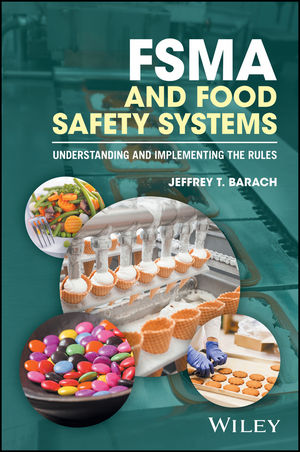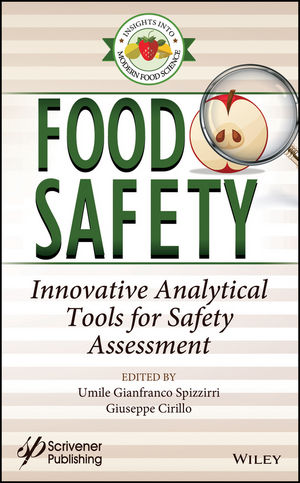You Say HACCP, I Say HARPC: Prepping for FSMA

With the advent of the Food Safety Modernization Act (FSMA), the U.S. Food and Drug Administration (FDA) has some 50 new required deliverables in the form of rules and regulations, reports and guidance to industry with which it must comply. These requirements touch every area of our food supply, from growers to harvesters, packagers and distributors, importers and warehouse holding facilities and the list goes on.
What was a function of compliance through the Hazard Analysis and Critical Control Points (HACCP) plan of keeping safety in check on seafood and juice products has morphed into much more robust Hazard Analysis Risk-based Preventative Controls (HARPC) for FDA-regulated food products. Prevention is the key to safety. Food companies are preparing for FSMA in a multitude of ways, long before the finalization of all rules. Some areas of preparation are more straightforward, such as reviewing and revising record keeping and documentation procedures, whereas others are less clear, such as determining the best method for insuring the FSMA compliance of suppliers. Whichever issue companies see as their most pressing, one of the biggest questions facing many is “which rules actually apply to me?”
What Is My Main Business?
FSMA is huge and its rules will reach across the food spectrum. Narrowing down the focus to those areas that apply to your business will help to break FSMA down into smaller bites that are easier to digest. “FSMA has a lot of “if – then” decision points, sometimes nested within decision points,” says Charles Breen, senior consultant for EAS Consulting Group, LLC. “IF the firm makes an acidified food, THEN the requirement for human food microbiological preventive controls do not apply, BUT other parts do.” There is a lot to consider.
Sit down with your team and make sure you fully understand how your business operates from top to bottom. From where do you get your materials? Where does your supplier get their materials? How does your facility run? Understanding the intricacies of every aspect will enable you to get a handle on your focus.
Based on the current proposed rules, “Go through a decision tree process and decide what applies and what does not,” says Breen. “Then look within current staff and see who knows the most about the three hazard areas, microbiological, chemical and physical, and their applicability to the processes used at an individual food facility.” Regarding the question of the requirement for qualified individuals (QI), Breen suggests “a qualified individual for chemical and physical hazard analysis [is likely to] be in-house more often than QI for microbiological hazards. Until FDA clarifies the standardized curriculum for a QI, firms should move forward using whoever is on hand now with the best facility specific information, and look outside as needed.”
Where Are the Hanging Chads?
Like it or not every business has an area that can more easily fall through the cracks than others. Those in the business of food, however, must be extra vigilant to prevent those small slips and oversights from happening. Period.
Review your procedures and food safety plan from top to bottom, from how you bring in and verify your suppliers and supplies to the conditions in which items are stored, maintenance checks and operations of your equipment, sanitation concerns, employee protocols, recall plans, allergen controls, everything. Now determine what is missing. Have you addressed all microbial, chemical, radiological and physical risks? The missing link could be as simple as the requirement for employees to wash hands. It could be more intricate such as verifying the (proposed) microbial standards of water applied in the growing of produce.
FSMA requires moving from merely documentation of safe operation to documenting the mechanisms for prevention in the support of safe operation. That’s where HARPC comes in. Identifying those areas of concern which are known or reasonably foreseeable and subsequently addressing those issues in writing, will help your company to be compliant with all things FSMA. This will prove essential in the event of an FDA question with regards to your product.
Review Your Labels
“The Food Drug and Cosmetic Act (FD&C Act) as amended by the FSMA now identifies food allergens as a food safety hazard that must be evaluated and controlled in section 418(b) of the FD&C Act. In particular, section 418(c)(3) requires preventive controls to assure that food is not adulterated under section 402 or misbranded under section 403(w),” says L. Robert Lake, senior consultant for EAS Consulting Group. “The Preventive Controls provisions of the FDA Part 117 proposal require a hazard analysis of known or reasonably foreseeable hazards to human food, including food allergens.” So while you are going through your hazard risk assessment, make sure to take into consideration “food allergen cross contact,” or the contamination by a food allergen of a food not intended to contain that food allergen.
HARPC
With the HARPC rules for human and animal feed scheduled to be published in August 2015, now is the time to think prevention. FDA offers Web-based tools such as a food defense planner, and there are multitudes of excellent articles and blogs in Food Safety Magazine that can get you thinking in the right direction. Bringing in an expert on FSMA for a readiness analysis and assessment of where your company is both strong and lacking in FSMA is another option. An independent advisor is often able to more clearly see potential lapses that can be overlooked by those in the trenches.
“Almost no food business in the U.S. is starting from zero when thinking about FSMA compliance,” says Breen. “I am confident that FDA will provide a lot of guidance, advice and assistance to help food firms understand their new responsibilities and obligations.” However, you need to be prepared. Start now if you haven’t already. These rules will be the largest change to FDA policy in many decades. Everyones compliance and participation with FSMA is not only required by law, but is a path forward to a safer process of food safety.
Don’t wait to start preparing for FSMA. The time for action is NOW!
Amy Scanlin, M.Sc., is with EAS Consulting Group, LLC.
Looking for a reprint of this article?
From high-res PDFs to custom plaques, order your copy today!









